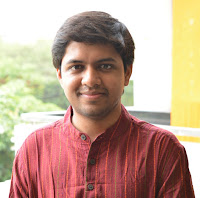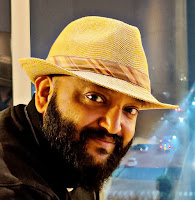Contextualizing Digital Art, Algorithms and NFTs
Speakers: Baiju Parthan, Harshit Agrawal and Shovin Bhattacharjee
Moderator: Nalini S Malaviya
In the current context, it is important to have a conversation on the relevance and scope of digital art, algorithms and NFTs in the Indian and global scenario. This panel attempts to locate digital art production, the import, originality and criticality of the image with regards to current trends, technological interventions, digital ownership and environmental implications of blockchain technology, if any.
Join me as I kick start #arttrackwithnalini, a series of conversations, online for now and hopefully in person soon, with experts in the field.
Recently a digital piece, by Beeple sold as an NFT for 69 million dollars at Christie’s. This has created quite a buzz, understandably. It is after all the 3rd highest priced work by a living artist.
But what does it mean for the art world, especially in the Indian context.
So, let’s talk about the relevance and scope of digital art, algorithms and NFTs with Baiju Parthan, Harshit Agrawal and Shovin Bhattacharjee, All 3 are extremely well known, inter-media artists who have been in the digital space and technology art for years, and who understand blockchain, cryptoart, artificial Intelligence and NFTs.
Some of the points we hope to cover are with regards to digital art production, what does originality and criticality of the image imply today, the role of technology then in the art making and distribution, what does digital ownership mean and are there any environmental implications of blockchain technology.
Let’s just start this conversation and see how much ground we can cover in this first session.
Baiju Parthan is a Mumbai based inter-media artist, working simultaneously with traditional media of painting as well as new media and digital technology based installation art. He is one of the early exponents of new media art and mediatic-realism in the Indian contemporary art scene. His work explores worldviews and ideologies that are in collision and the resulting ontological fallout felt and lived by all of us.
His work in the digital realm consists mainly of explorations into the mutating boundary where the virtual and real bleed into each other. Through a range of computer generated virtual objects presented as video installations, large scale prints on metallic surfaces, and 3D lenticular prints, Parthan manages to present a critique on high technology and its impact on our life and experience of reality.
He has participated in several landmark exhibitions including, New Interventions in Indian Art, China Art Museum Shanghai & Gaungdong Museum of Art, Guangzhou, China 2015, INDIA!, Centro Cultural Banco do Brasil (CCBB), Rio de Janeiro 2012, Indian Contemporary, Benedictine Museum, Fecamp, France, 2009, Beyond Globalization, Beijing, 2009, 101 Contemporary, Tokyo, 2008, International Live Art Festival Glasgow 2004, Kapital and Karma, Kunsthalle Wien, Austria 2002, and has shown at several important art fairs.
Harshit Agrawal is an artist working with artificial intelligence and emerging technologies. He is India’s first artificial intelligence artist, being the only Indian artist among 7 international AI art pioneers in the world’s first A.I art show in a contemporary gallery (Gradient Descent at Nature Morte). In his practice, he uses machines and algorithms and often creates them as an essential part of his art process, embracing becoming the cyborg artist. Harshit’s work is part of the permanent exhibition at the largest computer science museum in the world, HNF museum in Germany. He has exhibited work at other premier museums, galleries and art festivals around the world, like the Ars Electronica Festival (Austria), Asia Culture Center (Gwangju Korea), CADAF Contemporary and Digital Art Fair, HIRESOLUTION Exhibition for New Year’s Ball Drop at Times Square (USA), Museum of Tomorrow (Brazil), among others. He has given several talks at the subject of A.I and Art, including 3 TEDx talks. His work has also been extensively covered in international media, including BBC, New York Times, Artnet, Artsy, STIR World. Harshit has carried out residencies at the Museum of Tomorrow (Brazil), Art Center Nabi (Korea) and X-Lab (Japan). He graduated from the MIT Media Lab and IIT Guwahati. Along with his art practice, he has authored several publications and patents about his work at the intersection of human computer interaction and creative expression. He currently lives and works out of Bangalore, India.
Shovin Bhattacharjee is an artist working with painting, sculpture, digital art, new media art and public art installation. A pioneering digital artist, he is India’s first artist entering into an NFT art auction.
Born and brought up in Shillong (Meghalaya), he received his BFA and MFA degree in fine arts from Assam University, Silchar, and a diploma in conservation techniques from NRLC, Lucknow in 2002. Shovin has held seven solo shows with the Indian Cultural Centre Seoul, South Korea, in collaboration with Indian Art Museum at Seoul, South Korea.
He has also participated in National and International Exhibitions like “Spirit of India” Embassy of India, Lisbon in association with Art Catto Gallery at Conrad Hotel, Algrave, Portugal; 1st Digital Art Biennial, Brazil; Guanlan International print Biennial, China, India-Korea Art Exchange exhibition at Korean Cultural Center, New Delhi; “HANJI FESTIVAL” exhibition at Korean Cultural Center, New Delhi. 13th Asian Art Biennale organized by The Bangladesh Shilpa kala Academy, Dhaka, Bangladesh; 6th 7th and 8th International print Biennale organized by Bharat Bhavan, Bhopal; “Icon of Asia” International show at EM Art Gallery, Beijing, China; International print Biennale, Finland; Harmony Art shows organized by Harmony Art Foundation, Mumbai; All India Digital Art Exhibition, A.I.F.A.C.S., New Delhi; etc.
Shovin’s work is part of the permanent collection at the Indian Art Museum, Seoul, South Korea, CICA museum, South Korea; Lalit kala Akademi, New Delhi; National Gallery of Modern Art, New Delhi; Manipur Museum, Meghalaya State museum. Indian Cultural Centre, Seoul, South Korea; Art Catto, Portugal; He currently lives and works in New Delhi, India.
Moderator
Nalini S Malaviya is a Bangalore based art consultant, curator and writer. She curates contemporary art exhibitions, working with visual artists from across the country and offers curatorial and advisory services to individuals and corporate. She has been writing for the media since 2003, and has been an art columnist for Bangalore Mirror and has contributed to Financial Times (Delhi and Bangalore) and Times of India, Deccan Herald, several art magazines and artist books. She has written and presented papers for the Karnataka Lalithkala Academy Journal and several of her prefatory essays have been published as part of artist catalogues.
Some of her curatorial projects include ‘Convergence,’ an online exhibition as part of an art and media collective, ‘Bend’ an exhibition of sculptures, ‘Parallax of Visual Memories’, ‘Reimagining: (Un)Reality and Space’, ‘Irreverent Gene’ and ‘Polynomials of Relevance’.
Nalini is the Founder/Publisher of ‘Art Scene India’ www.artsceneindia.com, a popular blog cum Ezine featuring art news, events and articles on art, and is a resource center for artists and connoisseurs. Currently, she has a fortnightly art column for Sunday Herald, and is Member, Advisory Committee, National Gallery of Modern Art, Bangalore. She is also the Karnataka President for Arts Leadership Council, Women’s Indian Chamber of Commerce and Industry.
Please share this article using the social media widgets at the bottom and do subscribe to receive regular updates from Art Scene India.
To contribute articles, please get in touch at artsceneinfo@gmail.com


















